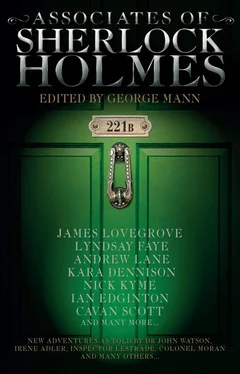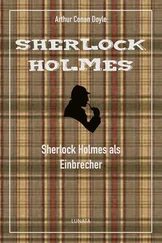Watson hurried to inform Sherlock of this, and found him in a bout of fisticuffs among drunken men, as the erstwhile Matherhyde was forced to show his metal during a bout of ribaldry. Watson’s presence proved fatal to his disguise, for, as it transpired, Welby’s new friends were none other than members of Rourke’s own regiment, who had but a week before been questioned by Watson in connection with their sergeant’s death. The jig, as the cant has it, was up. If Matherhyde’s anxious friend was the well-known Dr Watson, whom could the bibulous Matherhyde be but the disguised Sherlock Holmes? The logic is not perhaps exact; Dr Watson might have many friends, but to drunken and violent men – prone to the quick reactions and suspicions of soldiers – it sufficed. My brother and his friend were bodily thrown out of the drinking den.
Only later when they compared their view of the case was Sherlock to declare that he had now, to his own satisfaction at least, determined the sequence of events, though he was doubtful of proving them in any court of England.
Firstly the presence of the soldiers around Welby was no coincidence: even before his intent encompassed marriage, Rourke desired to have no rival in respect of Miss Athol. Thus he set his men, who were keen to curry favour with him, to dog Welby’s footsteps and to drag him down. It was in their company that he gained the reputation that led to Margaret Athol refusing his offer of marriage, and it was no doubt through Rourke or a third party instructed by him that Miss Athol learned of her former beau’s misdeeds. Rourke then was not so innocent a victim as he might have appeared, nor were his misdeeds confined to this country, for he had left behind him in India at least one thread ending in death, which was to change his status here.
The family of his former wife was by no means rich, though, and to orchestrate vengeance across the bounds of the Empire, or over time, requires either considerable resources or passionate fanaticism, of which there was no evidence in the case.
Someone, however, had both the means (perhaps hemlock, perhaps another drug) to paralyse the sergeant, the capacity to persuade him to drink it, and – perhaps – knowledge of the shot tower. The latter requirement my brother concluded was a lesser one for he had conceived recently – a possible delusion which he has communicated to me, but which as yet I have been unable to either prove or disprove – the view that certain sorts of crime: robbery, vengeance, the more outré and unsolvable of murders, were being better planned, better executed, and rendered more baroque and elaborate in their elegance than the London criminal classes would ever manage on their own. The shot tower then might well be an elaboration of a scheme of revenge, suggested by a third party – this planner of crimes – rather than a natural thought of the murderer.
It is the shot tower that makes me call this an awful crime. To imagine Rourke, whatever his faults, lying conscious (for hemlock merely paralyses the body, it does not deaden the mind, nor, so far as I know, prevent the sensation of pain) while he was ‘shot’ again and again, is to imagine a mind cold and humorously evil in its planning.
You disagree? It’s true, you and I, as well as Sherlock, deduced the method once the nature of the wounds was made clear to us. But to work backwards from calamity to cause is not the same as to pull the mechanism of causation from the air with a view to the causing of a calamity. That must be the mark of a brain that has teetered upon its throne of reason and begun a fall into utter blackness. A brain not unlike that of your late brother. Oh, sit down man. What good does a protest do between us?
Well, no matter. The brain that suggested the tower may be a matter for another time, but the more proximate identity of the murderer was, I’m sure you will agree, clear. Who did Rourke know with whom he might be inclined to take tea? Who would be able to persuade him to drink a herbal tonic? Who but his intended bride Miss Margaret Athol? The cause of her conspiring in his murder was partially shadowed, it was true. His treatment of her former lover? A sufficiently fanatical teetotaller might see the enticing of a man into the grip of drink as an awful crime. His abandonment of his wife? There was no way of proving that she was aware of either action. My brother, however, and this was I confess a thought worthy of us, asked himself a single crucial question.
You can’t guess?
It was this: given that the method of murder – the repeated striking of shot into the body – had suggested itself to the hypothetical master planner of crime, what aspect of the request on the part of his client (whether it was Miss Athol, or not) for vengeance could have suggested to this hidden master – let us term him M – such an image? Surely the punishment must in some way have fitted the crime for which revenge was desired? An artist, a veritable Leonardo De Vinci of crime, would demand nothing less.
Once asked it is obvious, is it not? The repeated striking of shot into a victim. What was the shot tower replicating, but the action of a firing squad? A very satisfactory replication for a criminal vengeance, for it involved no living band of soldiers to shoot high from pity or to break down from guilt thereafter.
Coming to this conclusion, Sherlock sent for a copy of Rourke’s military record in India – a request that I was able to facilitate – and discovered, what Rourke himself must have forgotten, or failed to connect to the prim and pretty Miss Athol of the Lady’s League, his presiding presence at the court martial and execution of Private John Benjamin Athol at Benares in India in 1887. John Athol, Margaret’s older brother, had taken advantage of the awful famine of that year to sell grain at inflated prices to the starving from military stores, profiteering from goods that were not his to dispose of.
My brother confronted Miss Athol with these facts and, with Watson as a witness, was present as she broke down and confessed. She defended her brother to the last, claiming that he had not sought vast wealth in gold or gems, or favours, for the grain but only desired to alleviate the horrible lack among the native population when so much was stored for the feeding of the army. My brother pressed her as to how she had arranged the murder, and how the shot tower “firing squad” had been conceived, but she refused to acknowledge any other hand in the business – although it was certain that she must have had accomplices in the movement of the body, if not in the conception of the crime. As to the sideburns and the moustache – her explanation for their removal was simple, although it struck my brother as an account she had from another mouth rather than her recounting something she had done. The falling shot had cooled insufficiently in one case during the bombardment of the body – as sometimes occurs in the process, the irregular shot so formed being discarded after passing through a sizing sieve – and a splash of still-molten metal had rebounded, catching in and singeing part of Rourke’s moustache on the right side. The removal had been intended to prevent this being visible, and the removal of the rest of the moustache and the sideburns had been a matter of symmetry.
Oh, if we only knew the kind of mind that demanded such mathematical symmetry and brought such mechanical aptitude to the commission of crime, eh Colonel! A pity your late lamented brother is no longer with us; it has the feel of his work does it not, or a least a family resemblance to it.
Of course, there is no proof – but I have sometime wondered, what if a disinterested party could have spoken understandingly to your brother, before he was too far steeped in crime, could he have been persuaded to step back from the abyss? The civil service can always use a brilliant mind, and even a macabre streak need not be an absolute bar to gainful employment. Something to think about perhaps. Still, I’m rambling, and I fear I have your Queen.
Читать дальше












